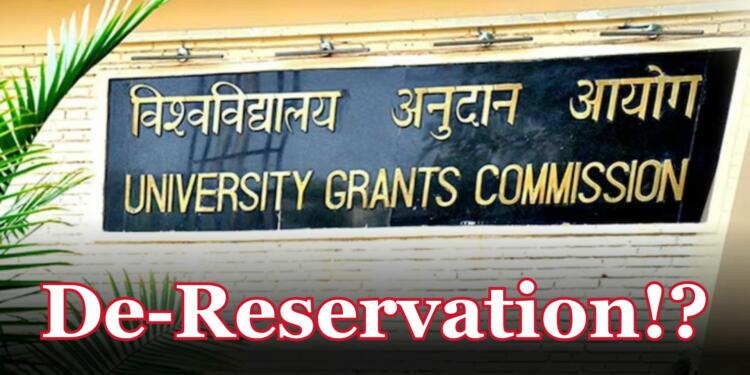In a recent development, the Education Ministry and the University Grants Commission (UGC) have come forward to clarify concerns surrounding the UGC’s draft guidelines on reserved faculty positions in centrally funded universities. The controversy arose over suggestions in the draft that hinted at the possibility of opening unfilled vacancies for SC, ST, and OBC candidates to general candidates in “rare and exceptional cases.”
UGC Draft Guidelines and De-Reservation Clarification
On December 27, the UGC shared draft guidelines on implementing the reservation policy in higher education institutions, inviting public feedback by January 28. The draft included a chapter on the de-reservation of unfilled quota posts meant for teachers, officers, and employees of a university. However, the Education Ministry and the UGC have clarified that there will be no de-reservation of reserved faculty positions in centrally funded universities.
The draft guidelines acknowledged a “general ban on de-reservation of reserved vacancies in case of direct recruitment.” Still, it outlined that in exceptional circumstances, de-reservation could be considered if the university provided adequate justification. Proposals for de-reservation concerning different job positions were required to be submitted to the Education Ministry or the Executive Council of the university, depending on the post category.
Current Academic Practices
As of now, reserved faculty positions are not converted to recruit general candidates in current academic practice. The Department of Personnel and Training (DoPT) allows de-reservation only in exceptional circumstances for Group A posts, but this provision has not been implemented in universities. Unfilled quota positions typically undergo re-advertisement, and universities conduct special recruitment drives until suitable candidates from the reserved categories are identified.
Constitutional Commitment
The draft guidelines were met with an uproar, with concerns raised about the potential impact on affirmative action and the constitutional commitment to reservation policies. Critics argued that introducing de-reservation could lead to discrimination against candidates from reserved categories. A statement jointly signed by prominent figures, including the former president of the Delhi University Teachers’ Association, expressed strong reservations against the proposed changes.
UGC Chairman’s Clarification
To address the concerns, UGC chairman M Jagadesh Kumar clarified that there has been no de-reservation of reserved category positions in Central Education Institutions (CEI) in the past, and there will be no such de-reservation in the future. Kumar emphasized the importance of filling all backlog positions in reserved categories through concerted efforts, assuring that the proposal had nothing to do with de-reservation.
Kumar reiterated that the draft guidelines were a work in progress and that anything related to de-reservation would be excluded from the final document. He emphasized the need for formal guidelines on implementing reservation in universities to avoid confusion, considering multiple circulars and court judgments on the matter.
Also Read: Google’s “Adobe Premiere Pro” Killer is here
Committee’s Explanation on De-Reservation Chapter
A committee member, speaking on condition of anonymity, explained that the inclusion of the de-reservation chapter in the draft was not an attempt to introduce a new provision but to reiterate what is already permitted by the DoPT. The objective was to create a comprehensive set of guidelines on implementing reservations in universities, addressing existing confusion stemming from various circulars and court judgments.
JNU’s Assurance and Constitutional Guarantees
Jawaharlal Nehru University (JNU) was the first to respond to the controversy. Vice-Chancellor Santishree Pandit issued a statement reassuring stakeholders that no posts in JNU had been de-reserved. Pandit emphasized the university’s commitment to implementing constitutional guarantees under the Reservation policy and highlighted that the highest number of reserved category faculty had been recruited during her tenure as VC.
Prompt Response to Alleviate Concerns
Explaining the prompt response, Pandit mentioned concerns in people’s minds following the news and the university’s proactive approach to allay those concerns. She reiterated that there had been no direction from the ministry on any change in the reservation policy, and JNU had no trouble attracting suitable candidates for reserved positions.
Positive Response to Reserved Positions at JNU
Pandit noted that JNU consistently received a significant number of applications for Assistant Professor positions, with 100-150 candidates applying for each reserved post. This positive response demonstrated the university’s commitment to faithfully implementing the reservation policy, a constitutional guarantee passed by the Parliament.
In conclusion, the clarification from the Education Ministry and the UGC provides assurance that there will be no de-reservation of reserved faculty positions in centrally funded universities. The draft guidelines, still in progress, aim to streamline the implementation of reservation policies while avoiding any unintended consequences.
























